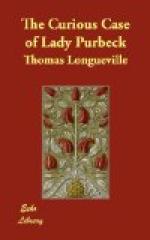Now, if Purbeck were still insane, or anything near it, no “speeches drawn from him” could have had any effect for the advantage of Lady Purbeck and Sir Robert. And it is clear from this letter that Lady Purbeck was even at that time on good terms with her husband and able to influence him. A reader might have been tempted to imagine that Purbeck’s “melancholy fitts” of insanity were the result of misery about his wife’s infidelity; but, if she could still “draw from him speeches to her advantage,” this cannot have been the case. The prosecution of Lady Purbeck was pretty clearly at the instigation of Buckingham and not of Purbeck. There is just a possibility that Purbeck had refused to proceed against her, and that Buckingham represented him as mad in order to act in his place, as his brother, and divorce Lady Purbeck; although such a theory is not supported by strong evidence. There is, however, this evidence in its support, that Purbeck acknowledged the boy christened Robert Wright as his own son some years later.
It is true that, fifty years afterwards, in a petition to the House of Lords[66] by Lord Denbigh against a claim made by a son of Robert Wright, it is stated that Lord and Lady Purbeck had not lived together as man and wife for two years before the birth of Robert Wright; and that Lord Purbeck “was entrusted in the hands of physicians for the cure of a melancholy distemper, occasioned by the cruelty and disorders of his wife.” But this claimed absence of two years, or anything approaching two years, is very questionable, if not very improbable; and although there is not much doubt as to the real parentage of Robert Wright, Purbeck may have lived with his wife sufficiently near the birth of the boy to imagine himself his father. Indeed, as the following letter will show, she was so far at Court, as to be living in Prince Charles’s house so late as February, 1625, a year after the birth of the boy. Moreover, as we have seen, Lord Purbeck held office in Prince Charles’s household, and from this it might be inferred that Purbeck and Lady Purbeck were then together. This is the more likely because in the following letter Buckingham expresses a fear that his “brother will be also every day running to her and give her occasion to worke on him by the subtlty of her discourse.” And if the husband and wife had access to each other when the proceedings against the latter had gone so far, they are much more likely to have been together during the year preceding the birth of the boy.
All this only affects the question whether Purbeck discredited his wife’s fidelity. Nothing has been said above in favour of the theory that she was faithful.
Buckingham experienced considerable difficulties in the prosecution of Lady Purbeck. On 15th February, 1625, he wrote[67] from Newmarket to the Lord Chief Justice:—
“MY LORD,




